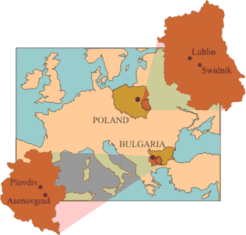Project 1: The Role of Urban Kinship Networks in Bulgaria
Third Party Funding: Volkswagen Foundation 2003-2006
I am currently working on a 3 year project funded by the Volkswagen Foundation which is titled: Political, Economic and Social Inclusion and Exclusion in Poland and Bulgaria. The comparative project focuses on the role of kinship networks in marginalising people from, or providing them with access to, economic and political resources. The research is being carried out with Frances Pine and 2 PhD students: Zlatina Bogdanova and Nastka Pilichowska (see background project description below).

The Bulgarian part of the research will be carried out in the province of Plovdiv in both a rural and urban site. I will be conducting the urban part of the Bulgarian research in the provincial capital of Plovdiv , located in the southern-central region of the country. It is the second largest city in Bulgaria with a population of just under 400 000. Plovdiv seems to be a particularly appropriate site for researching the role of kinship practices in terms of economic and political inclusion and exclusion, for a number of reasons. Firstly, it is a transportation hub, located on the main corridor between Turkey and western Europe. The city also connects southern Bulgaria with the other major cities in the country. Thus Plovdiv is particularly suited to exploring issues relating to migration and kinship. I will focus on how important kinship is in determining migration patterns and in providing networks for new settlers to the city from the surrounding villages, or for city inhabitants who decide to migrate to another country in search of employment and economic security. Secondly, Plovdiv is also an economic and commercial centre (hosting an International Trade Fair twice a year). The city’s major industries include: breweries and textile manufacturing. It has also a growing tourist industry which was boosted by the city’s status as the cultural capital of Europe in 1999. The city is thus a trade centre making it especially interesting when looking at the role of kinship networks in economic and commercial practices: are kinship networks important in gaining local urban trading advantages? More specifically, Plovdiv is the chief market for a fertile agricultural region and its major industry is food processing. There is, therefore, an economic and social dependency between the provincial capital and the surrounding rural area that needs to be examined. I expect that many of the connections between Plovdiv and the rural villages are associated with this industry and played out through kinship and friendship networks. Finally, as an administrative provincial capital, Plovdiv remains a local power base. The role of kinship in terms of participation in and exclusion from civil society organisations and even in local politics is also a topic for investigation.
As with the rest of Bulgaria , 1989 reforms in Plovdiv have led to economic decline; the city suffers from high levels of unemployment and poverty. The study of kinship networks (in providing access to or exclusion from economic and political resources) is thus pertinent in understanding some of the fundamental and practical problems of everyday life, and how these problems are addressed, in postsocialist Bulgaria .
